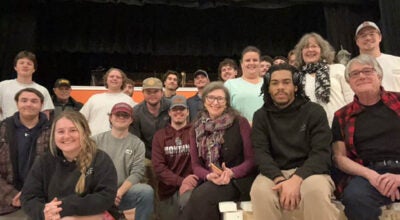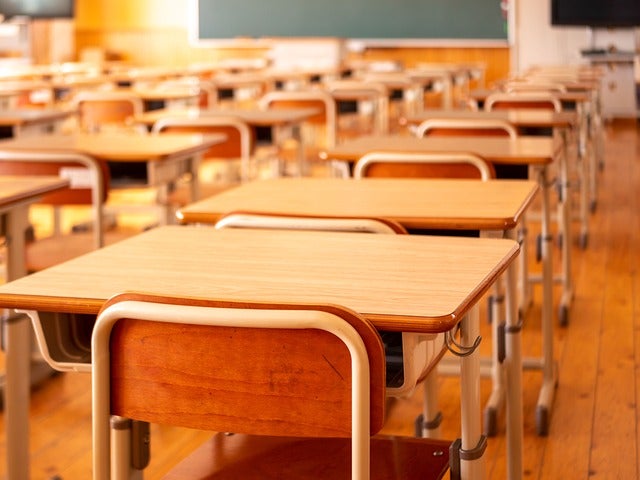Mom says return to school is critical for her kids
Published 6:00 am Friday, October 30, 2020
|
Getting your Trinity Audio player ready...
|
A Prince Edward County mother is hoping the local school system will elect to send children back to in-person classes in the near future, fearing the safety of virtual learning is outweighed by the effects it is having on children, particularly students with special needs.
Emma Webb is a working mother with nine children, six of whom are currently at home and enrolled in Prince Edward County Public Schools. She’s got kids in elementary, middle and high school.
Webb’s family is no stranger to COVID-19. In fact, it was affected firsthand by the virus in the spring. During the last school year, several members of the family, including some children, contracted COVID-19. The family was quarantined for four to six weeks and one family member was hospitalized. Some of the family members still have lasting symptoms, such as rashes, chronic fatigue and severe bruising, she said.
Webb initially was a supporter of a more virtual-oriented approach to the 2020-2021 school year, but her opinion has changed.
While most of her kids were honor roll students in the pre-pandemic world, the majority of her children are now borderline failing, especially her young elementary-school age son, who was recently diagnosed with dyslexia.
Webb explained that virtual learning did happen to some degree last semester as schools all over the country tackled the issue of how to wrap up the semester in the midst of a pandemic. However, the impromptu end-of-the-year grading system involved much more paperwork than online work, and students were able to pass primarily just by participating and turning in packets.
Now, her children work online weekdays from approximately 8:20 a.m. to 2:20 p.m.
While the sheer number of children attempting to use the internet is a nightmare by itself, she finds there are several other issues that make virtual learning exceptionally difficult, regardless of how many children are in the house.
One of Webb’s frustrations is found in the fact that the different school levels do not always use the same platforms/systems. That makes keeping track of how to communicate with each level confusing. A more universal method, she said, could help avoid complications.
Additionally, Webb is concerned about her younger children who don’t know how to type or understand concepts like having to unplug headphones in order to talk and participate during class. Webb’s children are often all working in the same room utilizing headphones to hear their classes, and it’s hard to communicate with teachers when other siblings are working.
Most nights, the parents have to make sure kids are caught up in their lessons and assignments. Large chunks of the weekend are usually spent playing catchup on school assignments.
Webb said the school informed parents that kindergarten through first-grade students would be given school-provided tablets to use around three weeks after school opened. Those tablets, she said, were finally available for pickup this Wednesday, Oct. 28. While her family was lucky enough to have devices the younger children could utlize in the meantime, she mentioned other families may have struggled to find ways of working around this.
Although Webb has many concerns about virtual learning, none are greater than her concern of students with special needs/disabilities being left behind.
Her young son was diagnosed with dyslexia around the same time the pandemic occurred. She said the effects of the last two semesters combined mean he is almost now a year behind in his studies.
Her son, Webb said, is actually able to go in-person to school twice a week where he is able to work on his disability and does other activities on his computer. She said he attends these in-person classes while having to miss online class time, meaning he must do catchup for any work the teachers and students may have done together as a class while he was away.
While attending school a few days a week is better than none at all, Webb worries her son is only falling further behind. She said while there are talks of a potential tutoring program for students through Hampden-Sydney College, after speaking with teachers it sounds as if there are currently no other programs or services that can be offered to her son.
“He can’t read at all, so for him to try to do math work and things like that on his own that have reading sentences he can’t do that presents additional challenges for him,” she added.
While Webb is sensitive to the potential dangers of the coronavirus and has witnessed its impact in her own family, she fears staying home may be a bigger detriment than returning to schools with a plan in place, especially for special needs students who need more time in the classroom.
“At this point I do think we have to weigh, ‘Are the kids losing more by staying home as far as their education?’” she asked.
“Twice a week for a child who has any type of learning disability, if it’s minor or severe, it’s inadequate obviously, because they’re not getting the same education that they get when they go to school.
“My priority is these children who have special needs, obviously, who are not getting any sort of education at this point. I love the teachers at Prince Edward, so I know this is challenging for everyone, but twice a week is just ridiculous for what they need.”
Webb added there are many school figures, including guidance counselors and the assistant high school principal, who have been phenomenal in their outreach to parents.
She said she reached out to each member of the School Board to voice her concerns, but only received a response from three board members. She also reached out to PECPS Superintendent Dr. Barbara Johnson, but said she did not receive a response.
She hopes Prince Edward will vote in November to return students to classrooms, implementing a hybrid format for a few weeks before getting kids back in the classroom full time. She believes while there’s no way to guarantee children will not get sick, consistent cleaning, persistent social distancing and mask wearing could make for a successful return that minimizes spread.
“I can appreciate that is a concern and I don’t take that lightly,” she said of the risk of spread, “but again, if the children are suffering to the point where the system is failing them then we need to figure out some way to help them. Online learning is not working in my opinion.”
And while she knows parents are in many ways responsible for their children’s educational success, and while the family has always been blessed with good teachers, the problem boils down to scores of parents who are doing all they can do and a school system that is likely doing all it can do.
But are students possibly suffering more by staying home?
“At this point, personally, I feel that they are.”





